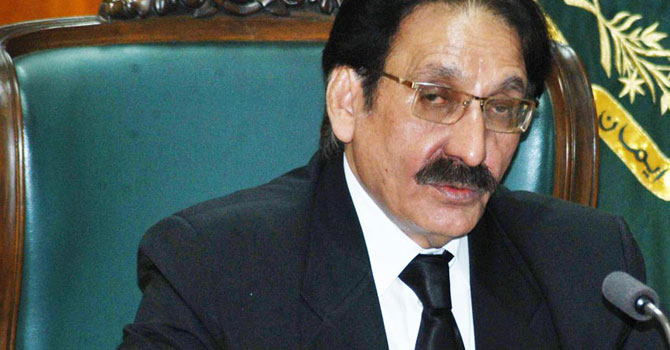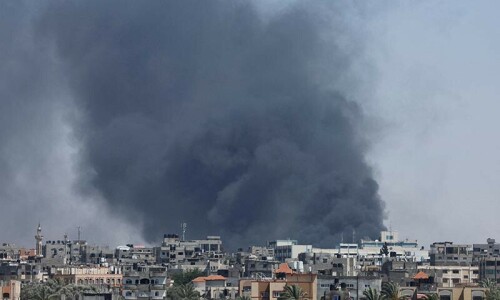
ISLAMABAD: Chief Justice Iftikhar Mohammad Chaudhry has expressed concern over an alarmingly high rate of acquittal in terrorism cases and called upon the government to take measures for effective prosecution of such cases in all provinces.
He was presiding over a meeting on implementation of the Anti-Terrorism Act, 1997, on Saturday. The meeting urged the government to enforce Section 21 of the Act, which provides for the protection of judges, counsel, public prosecutors, witnesses and people concerned with court proceedings.
It drew attention to a case in Sindh in which six witnesses were murdered one after the other and expressed concern that if such negligence continued no one would come forward to record evidence.
Senior judges of the Supreme Court Justice Tassaduq Hussain Jillani, Justice Nasirul Mulk and Justice Anwar Zaheer Jamali and monitoring judges of provincial high courts Justice Manzoor Ahmad Malik (Punjab), Justice Sajjad Ali Shah (Sindh), Justice Mian Fasih-ul-Mulk (Peshawar) and Justice Jamal Khan Mandokhail (Balochistan), SC registrar, home secretaries, IGPs, additional IGPs, secretaries prosecution and prosecutors general of all provinces and IG Islamabad attended the meeting.
The meeting noted that according to a report compiled by the prosecution department of Punjab government, the large rate of acquittal was on account of various factors, in particular, defective and dishonest investigation and weaknesses in prosecution.
It observed that the respective provincial government must address such defects and deficiencies immediately and impart necessary training to investigators and prosecutors and provide requisite equipment, including forensic lab.
The meeting noted that investigation should be carefully carried out so that innocent persons did not have to suffer the ordeal of investigation or trial and necessary material and all requisite witnesses were produced so that the guilty could be convicted and punished.
The IGPs made presentations regarding the causes of delay which are mostly due to defects in registration of cases, non-availability of eyewitnesses, no description of accused, role of accused not specified, material evidence not mentioned, delay in FIR registration, defects in investigation, defects in identification parade and doubtful recovery, etc.
The chief justice said the major reason for non achieving desired results was non-implementation of certain provisions of the Anti Terrorism Act. Not only that adequate protection had not been made available to presiding officers of the trial courts and investigators, but no protection whatsoever was available to the witnesses.
The witnesses usually avoid coming forward to depose against the culprits, especially in the cases of terrorism and sectarian killing. Thus, the matter of safety and protection of witnesses is very important and needs to be tackled on a priority basis. If there is no sufficient evidence, it is not possible for the court to inflict punishment without determining the guilt of the person. Nobody can be deprived of his life and liberty without due course of law.
He said backlog of cases in anti-terrorism courts in some places was partly because of delay in appointment of judges. Therefore, the issue of shortage of Judges must remain under constant focus.
He said the apex court had issued certain guidelines to be observed by the ATCs and related agencies like prosecution and investigation departments. The guidelines provided for a monitoring mechanism of functioning of these courts. Four judges of the Supreme Court and one for each province monitor the ATCs’ performance. The chief justices of high courts have also designated one judge each for the functioning of these courts.
The meeting agreed that initially two anti-terrorism courts, along with necessary infrastructure, staff and prosecutors, may be established in Islamabad because being a capital territory it has good number of anti-terrorism cases.At presently, the anti-terrorism cases of Islamabad are being heard at Rawalpindi ATCs.
It proposed that meetings of stakeholders in each province under the chairmanship of monitoring judges of the respective high courts be convened as soon as possible to formulate strategies and to resolve issues.












































Dear visitor, the comments section is undergoing an overhaul and will return soon.